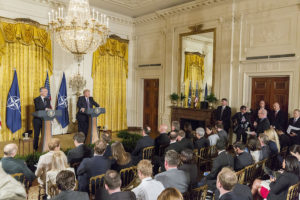
President Donald Trump and NATO Secretary General Jens Stolenberg participate in a joint press conference, Wednesday, April 12, 2017, in the East Room of the White House in Washington, D.C. (Official Who House Photo by Paul Williams)
Chris Preble, my friend and Cato Institute’s vice president for defense and foreign policy studies, suggest America rely more on its “mature, like-minded,” allies to help solve local problems. This is undoubtedly preferable to the forever-war policy that has been employed over the last decade and a half. Chris writes in The New York Times (abridged):
There is no question that America’s share of global wealth is shrinking. By some estimates, the United States accounted for roughly 50 percent of global output at the end of World War II. By 1985, its share stood at 22.5 percent. It has fallen to 15.1 percent today, and the International Monetary Fund projects that it will slip to 13.7 percent by 2023.
The proliferation of various technologies — from crude explosives to advanced robotics — has made it easier for even relatively small and weak countries and nonstate actors to challenge the big and powerful United States. These days any truly determined country, even a very poor one like North Korea, can develop nuclear weapons to deter attacks.
The United States already spends more on its military than the next seven or eight nations combined. Total annual expenditures, including for the wars in Iraq and Afghanistan, have averaged $561 billion since 2001.
America should seek a new arrangement that asks the beneficiaries of today’s relatively peaceful and prosperous world order to make a meaningful contribution to maintaining it. The American security umbrella will stay aloft — and American military power will remain formidable — but others will need to do more.
Rather than treating allies like reckless teenagers who can’t be trusted without Uncle Sam’s constant supervision, or feckless weaklings that will jump at the chance to capitulate to rapacious neighbors, Washington should empower mature, like-minded states to deal with local challenges before they become regional or global crises.
Transitioning to a world with many capable actors won’t be easy. It will require a deft hand to unwind defense arrangements, and patience as others find their way. Given their own domestic spending priorities and continued uncertainty about whether the United States will recommit to the old model, most American allies are likely to take a wait-and-see attitude. A gentle nudge might be needed to move them from comfortable adolescence to empowered adulthood.
Read more here.
For more on Chris, read his book The Power Problem: How American Military Dominance Makes Us Less Safe, Less Prosperous, and Less Free, and visit my series about him, The Most Important Person You May Have Never Heard Of.
If you’re willing to fight for Main Street America, click here to sign up for my free weekly email.






